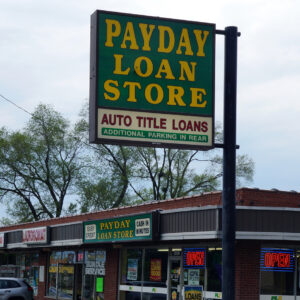Newly-released documents confirm allegations that the Obama administration used its regulatory powers to pressure banks into dropping clients involved in businesses of which it didn’t approve, such as payday lenders. Hundreds of pages of testimony and emails released as part of a lawsuit filed by Advance America and several other payday lending companies show that, as part of “Operation Chokepoint,” upper level directors at the Federal Deposit Insurance Corporation (FDIC) during the Obama years used their regulatory authority to pressure banks into dropping payday lenders as clients.
Operation Chokepoint, which officially ended in August, 2017, targeted certain banks for investigation by the Department of Justice on the basis of the types of customers they served. The FDIC warned banks of the “reputational risks” they faced by doing business with certain types of clients, including payday lenders. Banks that offered financial services with these customers risked increased scrutiny from federal regulators.
The case shows the chilling impact that regulation alone can have on lawful businesses. Despite the fact that they had not engaged in any wrongdoing, banks were convinced to drop certain customers targeted by the Obama administration.
“Although there are no specified fines or other costs associated with a bank serving a Payday Lender, running afoul of regulatory guidance by providing services to Payday Lenders (or other targeted industries, such as gun, ammunition, or tobacco product merchants) can produce a number of costs to a bank that regulators identify as having increased its ‘reputation risk,’” said Charles W. Calomiris, director of the program on financial studies at Columbia University, in a report prepared for the court last year.
“Regulators retain enormous discretionary power to punish banks as a consequence of perceived increases in ‘reputation risk,’ and it is not practically possible for banks to disprove regulatory judgments about increases in that risk or prevent regulators from punishing them on the basis of those judgments.”
He notes that, given the “Kafkaesque” nature of regulation in the banking industry, it was often easier for a bank to accept the loss of payday lenders, gun shops, and similar customers, than to shoulder the burden of increased regulatory costs.
The documents showed that Operation Chokepoint was both instituted at the highest levels of the FDIC and enthusiastically implemented by its agents in the field. As a result, businesses like that of Glenn Bassett, who runs a check cashing company in Redding, Cal., went to bank after bank, being told at each location that upper management would not allow them to open an account.
Bassett, who was turned down by a dozen banks when trying to open accounts for his business, said several locations specifically told him that this was because of the regulatory climate.
The FDIC crusade against payday lenders included some of its highest officials. Testimony shows that Christopher Spoth, senior deputy director of the division of supervision and consumer protection, told regional managers to pressure financial institutions “facilitating” payday lending to “submit a plan to exit the business.” Documents show that regional managers in Atlanta and Chicago directly pressured banks to stop doing businesses with payday lenders and Atlanta Regional Director Thomas Dujenski went out of his way afterward to ensure that the banks described the decisions as their own.
“We expected to find a concerted effort to pressure banks from doing business with our industry, but discovered the nearly unthinkable,” said Patrick O’Shaughnessy, President and CEO of Advance America, one of the payday lending firms that filed the suit.
“While claiming – publicly, under oath – to be combating illegal activity, high-ranking government bureaucrats deployed a clandestine crusade to eliminate our regulated and legal service. The campaign revealed that personal bias had motivated scorn for our industry, contempt for our millions of customers, blatant disregard for due process, and an unprecedented weaponization of government.”
Even more concerning, the FDIC document that warned banks of risks in certain types of third-party processing arrangements included 29 other merchant categories that could create “reputational risks” for banks. In addition to payday lending, these categories included lawful businesses like gun and ammunition sales and tobacco stores, which were listed alongside more illicit activities like escort services and ponzi schemes.
Although the Trump administration put an end to Operation Chokepoint, the damage had already been done. Having cut ties with the payday loan industry, few banks have changed their policies to allow these businesses to open new accounts. Observers fear that other industries on the list could also find themselves facing crippling regulatory scrutiny based on regulator biases, rather than their financial risk profiles.
“Despite hearing statements to the contrary from government officials for years, these records prove that there was an intentional and targeted campaign to carry out an illegal policy. If personal preference and subjectivity is the guide for regulation, an awful precedent is set and there is no end to the interests that can be targeted – pro-choice groups, environmental causes, religious groups and many more,” said Dennis Shaul, CEO of the Community Financial Services Association of America (CFSA).

